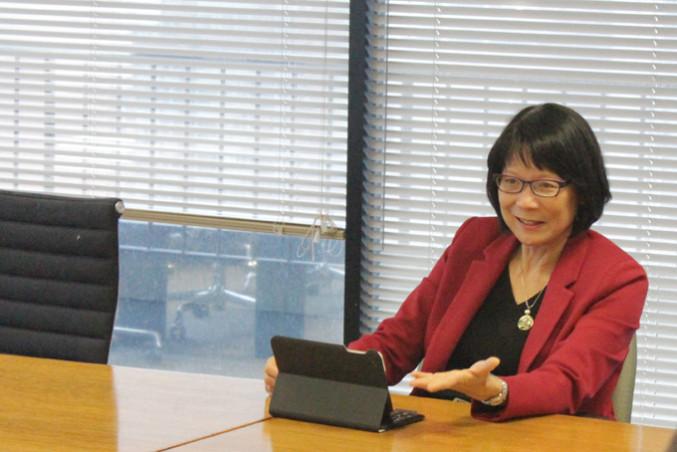By Erin Parsonage and Sierra Bein
Toronto mayoral candidate Olivia Chow stopped by Ryerson March 4 to talk with student journalists about her platform, eight days after missing a debate on campus between John Tory, David Soknacki, Karen Stintz and Mayor Rob Ford.
The conference was exclusive for student journalists from around the city in Ryerson University’s Jorgenson Hall. Chow revealed the subject of her final phase – the downtown relief line.
She hopes to transform public transit over three phases during her tenure – “immediate, medium and long term”.
The first phase to increase the bus ridership capacity during rush hour by 10 per cent is the primary focus of her transit campaign, while the medium phase centers around building a “world-class” light rapid transit system in Scarborough.
On March 2, Chow was condemned by her opponents for not making the relief line a top priority in her election campaign; yesterday, she defended the three-phase structure.
“It is a priority. I’ve said it. But there needs to be a comprehensive plan,” Chow said.
Before introducing the relief line as a campaign issue, the known left wing candidate wants more information – the number of stops, how the city will pay for it, specifics on environmental assessments and how long it will take to build.
Experts are meeting at the Sheraton Hotel today to iron out some of those details.
“One thing that is critically important with transit [is to] let the experts decide,” said Chow, who hopes the relief line will properly combat density issues.
According to her, a comprehensive transit plan includes integrating all the public transit agencies to facilitate comfortable, cooperative commutes.
But with a campaign focused on logical investments and a balanced budget, Chow does not want to go forward with new transit lines without knowing “how much money will be put on the table.”
She looks to the provincial and federal government to commit to a long-term investment in Toronto transit.
“We need to lock in the entire agreement for the next 10 years, 20 years,” said Chow.
Her primary campaign issues, to create jobs through small businesses depoliticize transit, budget fairly, and put children and family at the “heart of the city”, are part of a progressive theme she identifies with her candidacy.
“Progressive means you move forward, you make new ideas,” she said. “I don’t believe in keeping the status quo.”
Modeling her Toronto around children, Chow believes the city will have cleaner air, be safer, more walk-able and more enjoyable for everyone.
“If we design a city that is friendly to kids then you know it works,” said Chow, who will reveal more specifics of her children-centered initiatives this Sunday at her next press conference.
Another one of the main issues Chow focused on was youth employment.
Chow took a jab at Ford’s attitude on the issue, saying that she believes it’s a serious concern for the city.
“According to Rob Ford, ‘what problem?’ Actually, no. One in five young people can’t find a job,” she said.
By keeping property taxes low, she said, more small business owners will be able to hire more employees — including students.
Chow said she plans to tackle youth unemployment by creating more jobs through small businesses.
Chow said she is stunned that attaining a business license cannot be done online and plans to the process for newcomers by making documents available in other languages.
“Young people have the ideas, they are progressive because they have new ideas, they want change,” she said. “They’re energetic and they need to be engaged … and have the power to make a difference.”
“If you have ideas for what I should be focusing on, new areas, things I haven’t talked about do let me know, because my doors is always open,” she said.












Leave a Reply